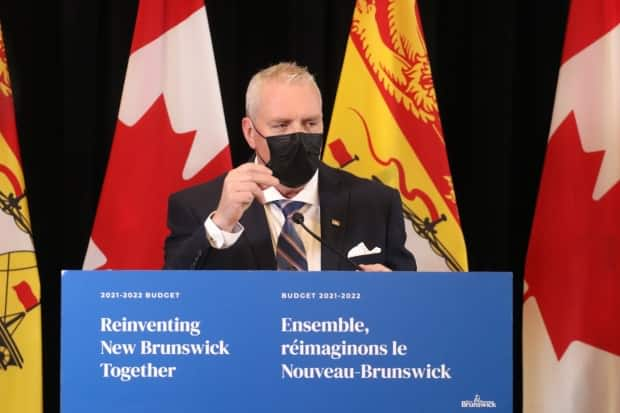N.B. spends $1B less than other provinces on COVID recovery, but economy is booming anyway

New Brunswick spending on pandemic relief and stimulus efforts over the last two years has been more than $1 billion below the average of other provinces, but New Brunswick's economy has been performing better than most despite that, according to a new analysis by Royal Bank economists.
"The better relative performance from the health perspective in the province, allowed the government not to have to respond as strongly as other governments," said RBC senior economist Robert Hogue, who monitors provincial economies for the bank.
"Kudos to not just the provincial government, but to all New Brunswickers to have been able to skate through this period and relatively successfully,"
The RBC report, released last week, is one of a number by big banks that have shown success in containing the COVID-19 virus in the Maritime provinces has generated significant economic benefits for the region on top of obvious health benefits.
Hogue and RBC economist Carolyn Freestone project that in New Brunswick's case, economic output this year will reach $40.8 billion.
Adjusted for inflation and other factors, that would be a 1.3 per cent increase in real economic growth since 2019, fourth best among provinces during the two years of the COVID-19 ordeal.
It's slightly less growth than RBC expects in British Columbia, Prince Edward Island and Nova Scotia during the same two years, but those provinces all spent significantly more to combat the virus and spur economic recovery than New Brunswick, as did the six provinces not growing as quickly.

According to RBC's calculation, the average amount spent by provinces over two years on COVID measures, not including federal support, is more than $2,200 per person. That is well beyond the $600 per capita it calculates is being spent by New Brunswick.
Spread out over the province's 782,000 people, that difference places COVID relief and recovery spending by the New Brunswick government over two years $1.2 billion below the provincial average.
"When your economy is not being as severely affected as other parts of the country, it's not surprising that you don't need to put measures to help individuals and businesses as much as elsewhere," said Hogue.
As of Monday, New Brunswick had recorded a total of 2,299 cases of COVID-19, one-twelfth of the Canadian average.
That led to fewer disruptions in day-to-day life for most people, and it has allowed many businesses to operate more freely during the pandemic than in other provinces.
New Brunswick Finance Minister Ernie Steeves credits more than $3 billion in direct pandemic spending by Ottawa in the province for cushioning the worst of the economic effects and insists low infection rates reduced the need for much supplemental spending beyond that.

"Part of our good fortune relies on the money the feds handed out to a lot of people," Steeves acknowledged in an interview Monday.
He said after that, "protecting the people" kept much of the economy operational and paying its own way.
"I think that's been the biggest success — keeping the economy open," he said.
Steeves noted other banks have made even more optimistic reports than RBC this year.
Scotiabank and TD each forecast in March that New Brunswick would likely end up as the best-performing economy through the two years of the pandemic, not fourth best, while also posting the lowest budget deficit per capita among all provinces.
"The province is tapping federal funding for the majority of its pandemic-related spending, helping to contain pressure on its fiscal position," said the RBC report.

